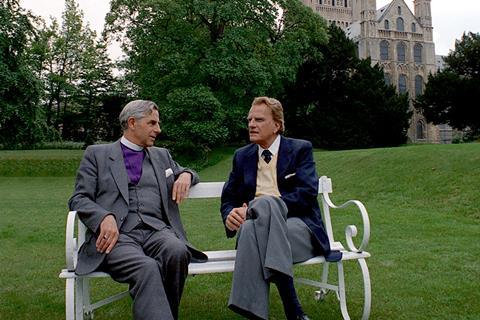Evangelical hymnwriter Bishop Timothy Dudley-Smith, rose to pre-eminence by the sheer quality of his writing, says fellow hymnodist, Christopher Idle. This “gospel-hearted bishop” was keen not to be outdone by more liberal writers

On any given Sunday, we are quite likely to be asked to sing one of the 400 hymns written by Bishop Timothy Dudley-Smith (TDS), who died peacefully at Cambridge on Monday, aged 97. Again, the chances are that it will be ‘Tell out, my soul, the greatness of the Lord’.
We might also be singing ‘Lord for the years your love has kept and guided’ (music by Timothy’s great friend Michael Baughen). Or an enterprising pastor or music leader might squeeze one of TDS’s Christmas hymns (he wrote a new one every Christmas for over 50 years) into our carol services. Timothy’s ‘Holy Child’ and ‘The darkness turns to dawn’ are surely worthy to stand alongside the Victorian classics – though King’s College Cambridge may take another hundred years to discover them.
Rhyming art
I first met Timothy when we were both in the group of keen young evangelical males working on what became Psalm Praise (1973) which helped to put Psalms back on the music-stand. Together with Michael ‘Calypso Carol’ Perry I was very much a new kid on the block. Michael Baughen, with two Youth Praise books under his belt, chaired the team; if TDS was not quite the senior member (take a bow, ex-missionary Jim Seddon), it was to Timothy we often turned for his obvious expertise in the crafting of words and lines.
By now he was already perfecting the rhyming art, where (in the footsteps of his hymnwriting guru Charles Wesley) he would rhyme every line (not every other) with its partner. And unlike many of his contemporaries TDS knew that ‘king’ doesn’t rhyme with ‘him’, nor ‘came’ with ‘pain’, and so on.
Timothy stayed friends with our little bunch, but never joined ‘Jubilate Hymns’ for its next project Hymns for Today’s Church (1982, 1987), mainly because he could not agree with wholesale revision of old hymns and the ditching of ‘thee’ and ‘thou’. Timothy simply rose to pre-eminence by the sheer quality of his writing; evangelicals were not to be outdone by the more celebrated liberal stars.
unlike many of his contemporaries TDS knew that ‘king’ doesn’t rhyme with ‘him’
His output was phenomenal. To take two soundings: in the hymn-book Praise! (2000) Timothy has 53 entries; compare Graham Kendrick with 28, John Bell 4, Stuart Townend 3. In the largest Ancient and Modern to date (2013) Timothy has 41, Bell 33, Kendrick 14, Townend 12.
I speak to those with the immeasurable joy of still having books in their hands, rather than the erratic screens or pewsheets. Books with A-Z arrangement are almost as bad as none at all. A digression? Hardly: Bishop Timothy was a hymn-book man, first and last; in practice it gives a much wider choice, and that for everyone.
Christ-centred
As might be expected from one with a background in the Cambridge University Mission in South London (now the Salmon Centre) and the Church Pastoral-Aid Society (totalling 14 years), the saving gospel of Christ, crucified and risen, featured largely in his hymns as in his life of witness and service. Even in hymns on other themes, the saving blood of Christ is not hard to find. Here, for instance, is a hymn for those in authority; the powers that be which are often (we hope) prayed for but rarely sung about:
“So may our hearts remember yet / That cross where love and justice met / Who loves and reigns, our risen Lord / Where justice sheathes her righteous sword.”
Significantly, this hymn - ‘O God whose all sustaining hand’ - was requested by the High Sheriff of Essex; Timothy was eager to help, while (as always) crafting a text which could be used in many other places.
Timothy was not merely the supreme hymnwriter of his generation and a gospel-hearted archdeacon and bishop (of Norwich and Thetford respectively); he cared about prisoners, persecuted Christians, global outreach and the environment. Every future biographer of John Stott will have to take account of TDS’s pioneering two volumes (1999, 2001) about his great friend.
Timothy was one of two Honorary Vice-Presidents of the Hymn Society of GB and Ireland; he often spoke at its conferences and contributed to its literature. Many other honours were bestowed on him, none undeserved though little known to the world. But his main legacy will surely be in the words he has given us to sing, to the praise and glory of God.




































No comments yet